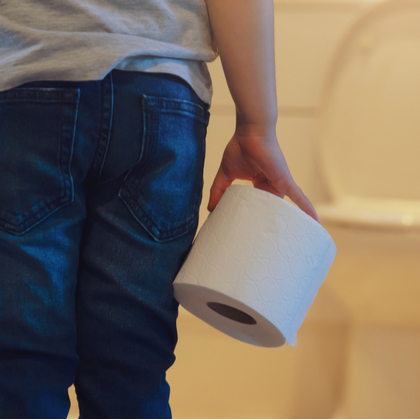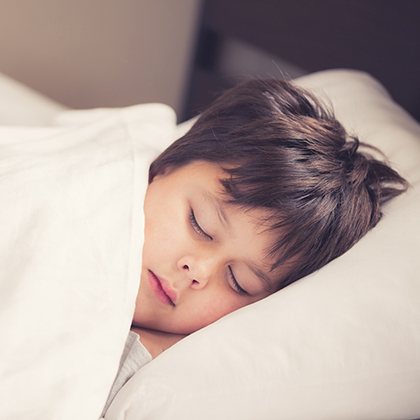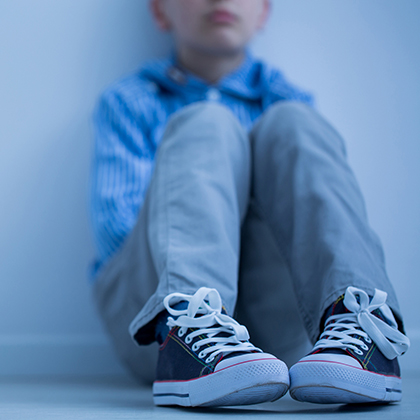
Most children stay dry through the night as they get older. But if your child is affected by bedwetting it can be frustrating – not to mention embarrassing – for them as well as the rest of the family. Thankfully there are things you can do that may help.
Bedwetting – which is also called nocturnal enuresis – may not often be talked about outside the family, but it’s quite common. While it’s considered normal in children who are under the age of five, up to one in five five-year-olds and one in 10 10-year-olds are thought to wet their bed at night, with boys more likely to be affected than girls (i). A small number of these children continue wetting the bed as they get older too, with one in 75 teenagers thought to wet the bed (ii).
Bedwetting also runs in families. If one parent used to wet the bed, then their child has a 40 per cent chance of having the same problem. But if both parents used to wet the bed, their child is 70 per cent more likely to do the same too (ii).
What causes bedwetting in children?
According to ERIC, the children’s bowel and bladder charity, there are three main reasons why bedwetting affects some children while others stay dry at night:
-
The kidneys of affected children produce too much urine during the night.
-
Their bladders don’t yet stretch enough to hold all the urine their kidneys make at night.
-
When their bladders are full during the night, they don’t wake up.
There are also several underlying health problems that can make bedwetting more likely in some children – though some aren’t very common – including:
-
Constipation (this can cause irritation in the back of the bladder)
-
Type 1 diabetes
-
Urinary tract infections (UTIs)
-
Obesity
-
Attention deficit hyperactivity disorder (ADHD)
-
Conditions that cause developmental delay in children, such as Down’s syndrome and cerebral palsy.
-
Sleep apnoea (where there are pauses in breathing during sleep)
-
Some rare bladder disorders
Meanwhile some experts believe stress can cause bedwetting or make it worse (iii), since some children can suddenly start to wet the bed during periods of change (starting a new school, for instance). However, according to ERIC bedwetting isn’t actually caused directly by psychological issues such as stress and anxiety (iv). Instead the problem comes about because a hormone that limits the amount of urine your kidneys produce at night – namely vasopressin – is affected by anxiety, which may lead to some children producing too much urine for their bladders to hold at night.
How do I help my child?
If your child has a problem with bedwetting there are several things you can try yourself at home.
-
Make sure they have plenty of fluids to drink during the day. This helps get their bladder used to filling up and holding onto urine. According to the British Nutrition Foundation, recommendations from the European Food Safety Authority include the following (assuming that 70 - 80 per cent of children’s fluids comes from drinks) (v):
4 - 8-year-olds should drink 1 1 - 1.3 litres a day
9 - 13-year-old girls should drink 1.3 - 1.5 litres a day
9 - 13-year-old boys should drink 1.5 - 1.7 litres a day
It may be a little simpler to remember that most children should drink around 6 - 8 cups of fluid every day (i). However, try to avoid giving them drinks that contain caffeine such as tea, cola, coffee and hot chocolate, as caffeine may make bedwetting worse. -
Try not to give your child too much to drink in the 2 - 3 hours before bedtime – just give them drinks if they are thirsty during this time.
-
Encourage them to get into the habit of going to the toilet just before they go to bed. Also try to make sure they go to the toilet regularly during the day – according to the NHS children should go to the toilet around 4 - 7 times a day, including just before bedtime (iii).
-
Make sure they can access the toilet easily during the night if they need to (try using a night light or leaving the light on in the bathroom, for instance).
-
Treat constipation, which is very common in children. Find out more about the symptoms and treatments in our guide to constipation in children.
-
Offer them rewards for positive actions, such as using the toilet before bed or drinking the right amount of fluids during the day. This may be more helpful than just rewarding them whenever they have a dry night. Most importantly try to make them understand they haven’t done anything wrong whenever they don’t have a dry night, and praise them when they make any improvement.
-
While your child is wetting the bed, let them continue to wear pull-ups – then when they start to improve, try removing the pull-ups on a trial basis and see how they get on.
You could also try using waterproof covers on both the mattress and duvet on your child’s bed, as it may be far less stressful if there are only sheets to wash. If your child is older you could also leave clean nightclothes bedclothes in their bedroom so that they can change themselves, as they may find it less embarrassing. -
I t can often be a good idea to encourage your child to help with changing their sheets following a wetting incident. This may make them more likely to get out of bed and use the toilet, so they don’t have to go to the effort of changing their sheets whenever they have an ‘accident’. However try not to cause any kind of a fuss about it – try to make changing the sheets as matter of fact as possible.
-
Be prepared ahead of time if your child is going to be sleeping away from home. If they’re going to be staying with friends or relatives or going on a school trip, speak to the adult in charge first, so that it doesn’t come as a surprise if your child doesn’t stay dry overnight. It may also be helpful for them to wear pull-ups on such occasions, to avoid any embarrassment.
What is the best treatment for bedwetting?
Most children eventually stop bedwetting without any treatment. However, if you or your child is finding it hard to cope with bedwetting, your GP can offer support and advice.
You may also want to see your doctor if your child is affected by bedwetting while having other symptoms such as constipation or a high temperature, or if they’ve been dry at night for a while but have suddenly started wetting the bed again.
Two of the main treatments your GP may suggest are a bedwetting alarm or a medicine that reduces how much urine your child produces during the night.
Using a bedwetting alarm
Doctors often recommend trying a bedwetting alarm as an initial treatment. These include a sensor that attaches to your child’s underwear and pyjamas. This sets off the alarm when it senses liquid, and can be helpful if your child doesn’t wake up when their bladder is full during the night.
With regular use bedwetting alarms may help your child start to recognise the message their bladder is sending to their brain when their bladder is full, which may help them to either wake themselves up and go to the toilet or learn to control their bladder muscles more effectively.
There are a few different types of bedwetting alarms. One has a small sound box that attaches to your child’s pyjama top with a wire connecting the box to the sensor in their underwear. Others can be wireless, with the sound box being placed on a bedside table. There’s also a type of bedwetting alarm that includes a sensor mat that you place under your child’s lower sheet, which is connected via a wire to a bedside table sound box. Some mat-style bedwetting alarms also vibrate when the sensor detects liquid, which may help if your child finds it difficult to wake up when the alarm goes off.
You can also try to make sure you can hear the alarm too – by using a baby monitor, for instance – so that you can wake your child up when the alarm goes off until they get used to hearing it and waking themselves.
Bedwetting alarms are often successful, with clinical trials and reviews suggesting they are the most effective treatment for bedwetting (vi). They are thought to reduce bedwetting in about two thirds of children who are using them, with half of children remaining dry after they stop using them (vi). Bedwetting alarms aren’t available on the NHS, but you can often borrow them from your local continence advisor – get their details from your GP or practice nurse – or you can buy them from pharmacies and specialist websites.
Are there bedwetting
Your doctor may, on the other hand, recommend your child takes a prescription medicine. The most common medicine used to treat bedwetting is called desmopressin. This works by stopping your child’s kidneys making too much urine during the night by topping up their vasopressin levels. Desmopressin is thought to work well in about seven out of 10 children (i). However there are some drawbacks:
-
Desmopressin is generally only used in children aged seven years and older (there are some exceptions, but it is not used in children under five).
-
If your child takes desmopressin, they should only have sips of fluid from one hour before taking their medicine until eight hours afterwards if they are thirsty. If they’ve had a lot to drink during the evening, they shouldn’t take desmopressin that night.
-
Bedwetting can return when children stop taking desmopressin.
-
It can cause side effects such as headache, feeling sick and mild stomach pain – though side effects with desmopressin are rare.
Desmopressin can have an immediate effect on the first night of treatment so it’s often recommended for short periods, such as when a child has a sleepover or stays away from home for a night or two.
If it’s taken regularly rather than just for a one-off occasion, most children take desmopressin for a minimum of three months without a break. After three months they stop taking it for a week to see if their own vasopressin levels have increased (most children produce more vasopressin as they get older). Then if they still need to take desmopressin, however, they can have repeated courses for as long as necessary.
Bedwetting can be stressful for children and parents alike. But there’s lots you can do to help a child who doesn’t stay dry every night. This guide should give you an idea of the steps you can take to tackle the problem yourself, as well as the options your doctor might suggest. Find out more about a wide range of health issues by browsing our health library which includes a section on children’s health.
References:
-
Available online: https://patient.info/childrens-health/bedwetting-nocturnal-enuresis
-
Available online: https://www.eric.org.uk/Handlers/Download.ashx?IDMF=8ca87a7f-210f-4c8f-85c2-185d33d2f22a
-
Available online: https://www.nhs.uk/conditions/bedwetting/
-
Available online: https://www.eric.org.uk/Blogs/blog/debunking-some-bedwetting-myths
-
Available online: https://www.nutrition.org.uk/healthyliving/hydration/hydration-for-children.html
-
Available online: https://patient.info/childrens-health/bedwetting-nocturnal-enuresis/bedwetting-alarms
Related Posts
Disclaimer: The information presented by Nature's Best is for informational purposes only. It is based on scientific studies (human, animal, or in vitro), clinical experience, or traditional usage as cited in each article. The results reported may not necessarily occur in all individuals. Self-treatment is not recommended for life-threatening conditions that require medical treatment under a doctor's care. For many of the conditions discussed, treatment with prescription or over the counter medication is also available. Consult your doctor, practitioner, and/or pharmacist for any health problem and before using any supplements or before making any changes in prescribed medications.

Keri
Keri Filtness has worked in the Nutrition Industry for 19 years. She is regularly called upon for her professional comments on health and nutrition related news. Her opinions have been featured by BBC3, Prima, Vitality, The Mirror, Woman’s Own and Cycling Weekly, amongst others. She has also worked one to one with journalists, analysing their diets and health concerns and recommending changes and additions, where appropriate.
View More



